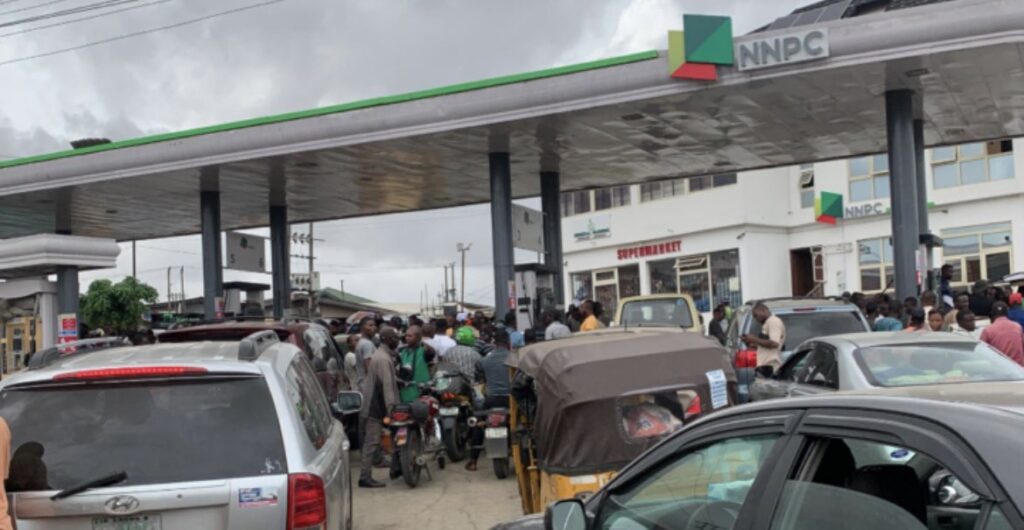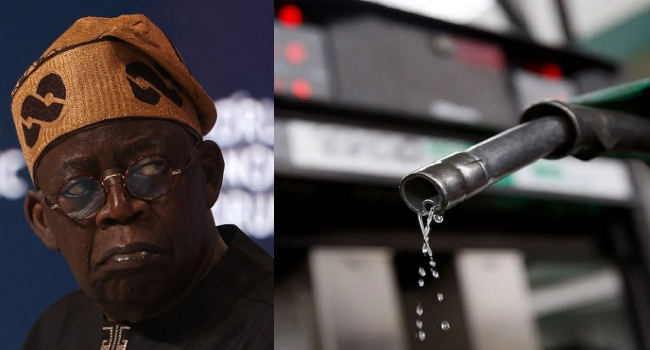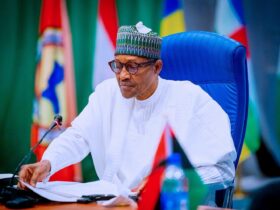Nigeria’s daily consumption of Premium Motor Spirit (PMS), commonly known as petrol, has seen a sharp decline in less than a year since Bola Tinubu took office on May 29, 2023.
Data obtained from the Nigerian Midstream and Downstream Petroleum Regulatory Authority (NMDPRA) Daily Truck Out Report shows that by August 20, 2024, petrol consumption had dropped to 4.5 million liters per day. This is a significant decrease from the 60 million liters per day recorded in May 2023.
The data estimates a staggering 92% reduction in daily consumption since May 29, 2023.
Further analysis of the report revealed that, surprisingly, only 16 out of Nigeria’s 36 states received product allocations from the Nigerian National Petroleum Company Limited (NNPCL) during the review period.

This meant that those states that did not get product allocation suffered scarcity in August.
A breakdown of how NNPCL distributed petrol among the 16 states revealed that Niger received the highest allocation of 21 trucks, totaling 940,000 liters daily. Lagos followed with 12 trucks, amounting to 726,001 liters, while Kaduna received 12 trucks, supplying 454,001 liters.
Other allocations included Oyo, which got 12 trucks of 454 liters, Kano with 9 trucks, Ondo and Kwara each receiving 6 trucks, Edo and the FCT with 4 trucks each.
Sokoto received 4 trucks, Ogun and Osun got 3 trucks each, while Gombe, Benue, Ekiti, and Kebbi each received 1 truck.
Tinubu had declared an end to petrol subsidies on May 29, 2023, after subsidies had cost the country about N12 trillion over 10 years.
According to Tinubu, petrol subsidy payments had become unsustainable, driving the country into significant debt.
READ ALSO: Nigeria is Challenging Right Now, But Don’t Give Up — Peter Obi Urges Youths
Since the removal of subsidies, petrol prices have surged from N195 per liter to around N1,300 per liter, pushing headline inflation to a nearly three-decade high of 34.19% in June, before easing to 32.7% in September.
The rising cost of living has also worsened, with 129 million Nigerians now plunged into poverty, according to the latest World Bank data.
According to the global financial body, the over 129 million Nigerians represented a sharp rise from 40.1 per cent in 2018 to 56 per cent in 2024.
The World Bank report read, “With growth proving too slow to outpace inflation, poverty has risen sharply. Since 2018, the share of Nigerians living below the national poverty line16 is estimated to have risen sharply from 40.1 per cent to 56.0 per cent.
“Combined with population growth, this means that some 129 million Nigerians are living in poverty. This stark increase partly reflects Nigeria’s beleaguered growth record. Real GDP per capita has not recovered to the level it was at prior to the oil price-induced recession in 2016.
“The COVID-19 pandemic compounded this drop in economic activity. Moreover, growth is failing to outpace inflation: large increases in prices across almost all goods have diminished purchasing power.”
It added, “Multiple shocks in a context of high economic insecurity have deepened and broadened poverty, with over 115 million Nigerians estimated to have been poor in 2023. Since 2018/19, an additional nearly 35 million people have fallen into poverty, so that more than half of Nigerians (51.1 per cent of the population in 2023) are now estimated to live in poverty.”
A related report by a foreign news medium, AFP, also detailed how Nigerians have since abandoned their cars as a result of the pounding hardship.
“I parked it at my son’s house. I use public transport now,” Emmanuel, a 72-year-old retired health worker, told AFP. “It is not convenient, but it is what the economy demands.”
Car dealers in Lagos and Abuja told AFP that they had seen more and more people trading their fuel-guzzling cars and sports utility vehicles (SUVs) for more efficient vehicles to cut costs.
“People are actually selling their big cars these days,” Maji Abubakar, a car dealer in Abuja, told AFP. “The problem is that even if you put them on the market, there isn’t much demand for them.”
“It has been more than a year since I sold a car with an eight-cylinder engine, and the major reason is the price of petrol,” he added.
Follow Parallel Facts on WhatsApp Channel: https://whatsapp.com/channel/0029VaCQSAoHgZWiDjR3Kn2E









Leave a Reply